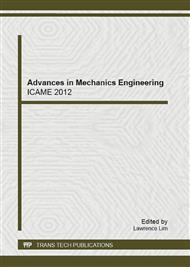[1]
Najm, F.N., A survey of power estimation techniques in VLSI circuits, Very Large Scale Integration (VLSI) Systems, IEEE Transactions on , vol. 2, no. 4, pp.446-455, Dec. (1994).
DOI: 10.1109/92.335013
Google Scholar
[2]
B. Kitchenham O. Pearl, D. Budgen M. Turner J. Bailey, S. Linkman, Systematic Literature reviews in software engineering – A systematic literature review, Information and Software Technology, 51(1): 7-15, January 2009.
DOI: 10.1016/j.infsof.2008.09.009
Google Scholar
[3]
K. Petersen, R. Feldt, S. Mujtaba, M. Mattsson, Systematic mapping studies in software engineering, in: 12th International Conference on Evaluation and Assessment in Software Engineering (EASE). University of Bari, Italy, 26–27 June (2008).
DOI: 10.14236/ewic/ease2008.8
Google Scholar
[4]
Tiwari, V.; Malik, S.; Wolfe, A.; , Power analysis of embedded software: a first step towards software power minimization, Very Large Scale Integration (VLSI) Systems, IEEE Transactions on , vol. 2, no. 4, pp.437-445, Dec. (1994).
DOI: 10.1109/92.335012
Google Scholar
[5]
Tero Arpinen, Erno Salminen, Timo D. Hämäläinen, Marko Hännikäinen, MARTE profile extension for modeling dynamic power management of embedded systems, Journal of Systems Architecture, February (2011).
DOI: 10.1016/j.sysarc.2011.01.003
Google Scholar
[6]
Hu Jun, Li Xuandong, Zheng Guoliang, and Wang Chenghua. 2006. Modelling and analysis of power consumption for component-based embedded software. In Proceedings of the 2006 international conference on Emerging Directions in Embedded and Ubiquitous Computing(EUC'06), Xiaobo Zhou, Oleg Sokolsky, Lu Yan, Eun-Sun Jung, and Zili Shao (Eds. ). Springer-Verlag, Berlin, Heidelberg, 795-804.
DOI: 10.1007/11807964_80
Google Scholar
[7]
Blouin, D.; Senn, E. CAT: An extensible system-level power Consumption Analysis Toolbox for Model-Driven design, NEWCAS Conference (NEWCAS), 2010 8th IEEE International , vol., no., pp.33-36, 20-23 June (2010).
DOI: 10.1109/newcas.2010.5603737
Google Scholar
[8]
Aouad Maha Idrissi, Schott René, Zendra Olivier, Hybrid Heuristics for Optimizing Energy Consumption in Embedded Systems, Lecture Notes in Electrical Engineering, pp: 409-414, (2010).
DOI: 10.1007/978-90-481-9794-1_76
Google Scholar
[9]
Tian-Yi Ma; Zhi-Qiang Li; Jun Yang; , A Novel Neural Network Search for Energy-Efficient Hardware-Software Partitioning, Machine Learning and Cybernetics, 2006 International Conference on , vol., no., pp.3053-3058, 13-16 Aug. (2006).
DOI: 10.1109/icmlc.2006.258365
Google Scholar
[10]
Mera, D.E.; Santiago, N.G.; , Low power software techniques for embedded systems running real time operating systems, Circuits and Systems (MWSCAS), 2010 53rd IEEE International Midwest Symposium on , vol., no., pp.1061-1064, 1-4 Aug. (2010).
DOI: 10.1109/mwscas.2010.5548830
Google Scholar
[11]
Amit Sinha and Anantha P. Chandrakasan. 2001. JouleTrack: a web based tool for software energy profiling. In Proceedings of the 38th annual Design Automation Conference (DAC '01). ACM, New York, NY, USA, 220-225.
DOI: 10.1145/378239.378467
Google Scholar
[12]
David Brooks, Vivek Tiwari, and Margaret Martonosi. 2000. Wattch: a framework for architectural-level power analysis and optimizations. SIGARCH Comput. Archit. News 28, 2 (May 2000), 83-94.
DOI: 10.1145/342001.339657
Google Scholar


